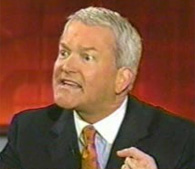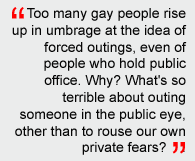On 29 September 2006, Mark Foley resigned from the US House of Representatives after ABCnews.com revealed details of his sexually suggestive instant message conversations with teenaged former congressional pages. Foley, a Republican representing a district in Florida, had been in Congress since 1994.

Former Congressman Mark Foley was forced out of the closet because of a scandal involving former male pages.
Strip away the hyperbole and Foley's transgression is not as heinous as some make it out to be. While he's been reported to be unusually friendly to pages, he's not been accused of any physical misbehaviour. The sexually laden conversations that have come to light have in the main been with former pages, who have completed their stint, not while they were in the program.
Some of them would be 18 to 20, usually considered old enough to decide for themselves how far they want to take any relationship. In fact, it appears that it was the pages themselves who first blew the whistle.
Words bandied around, like "pedophile," are not supported by the facts. However disagreeable, what Foley did was not pedophilia, which by definition involves pre-pubescent children, like former rock star Gary Glitter and the young Cambodian and Vietnamese girls he exploited.
Nonetheless, it is undeniable that carrying on with persons 30 years younger than oneself, especially if one held a position of trust, would be a grave misjudgement. It could also be argued that Foley exploited his access to pages for personal interest, and that would be unprofessional under any circumstances.
Furthermore, Foley may have broken a few laws; the US Justice department is currently investigating.
Yet in terms of the political earthquake it has caused, you have to ask, if the pages that Foley had groomed were female, would there be the same degree of newsworthiness? How different would that have been from the Clinton-Lewinsky saga? In the case of the latter, while the Republicans tried to bring Clinton down over it, Americans in general, while titillated and embarrassed, put it in perspective and moved on. And that case involved the President of the United States.
The foregoing may sound like I am moving to make light of Foley's misdeeds, putting the blame on the anti-gay crowd. You'd be mistaken. The Foley case sickens me. It sickens me not because of what the homophobes are venting about, but because of what Foley attempted to excuse himself with. When the dirt came out, his first response, made through his lawyer, was to make it sound as if by confessing to being gay, it explained most of it. "Mark Foley wants you to know he is a gay man," said his attorney David Roth to reporters.
Roth also suggested that the inappropriate messages were sent under the influence of alcohol, adding for good measure that Foley, a Roman Catholic, had been a victim of clerical molestation between the ages of 13 and 15.
That man Mark Foley has no honour. He behaved badly and tried to avoid responsibility for it, blaming other factors instead. And all of us who are associated with one or more of those other factors are tarred.
Other Congressmen have reported that they've hardly seen Foley drink, so why was he blaming alcohol for impaired judgment? Most people who have been victims of childhood molest have gone on to lead upright lives; so planting in the public mind the notion that they are potential perpetrators in their turn is terribly unfair.
And of course, Foley has done no service to gay people by acknowledging his sexual orientation only now. He has given ammunition to all sorts of homophobes ever ready to link being gay with predatory sexual behaviour.
Many of Foley's associates had long suspected he was gay. A newspaper had been trying to persuade him to come out of the closet some years back, but being in the Republican Party, it would have been political suicide for him. This is the party which, under George W Bush, has stoked hysteria over gay marriage at every election in order to bring out the vote.
Knowing this, are we to be forgiving? Not me. The hypocrisy sickens me even more.
Each time he was asked about his sexual orientation, Foley would parry the question by claiming the right to privacy. "Elected officials, even those who run for the United States Senate, must have some level of privacy," he once said.

As David Link wrote in his Op-Ed in the Boston Globe (5 Oct 2006), this is the "revenge of don't ask, don't tell," the famed prescription by which many in conservative circles try to finesse the question of homosexuality. Such a policy encourages secrecy and dishonesty, and the Foley case shows how corrosive it can be to integrity in public service.
But lest we heap all the blame on Republicans and conservatives, we should also ask, if it was known or at least strongly suspected for such a long while that he was gay, why did everybody including the media conspire to keep it quiet, waiting for him to out himself? Why didn't somebody out him well before this?
This is where I must point, unflatteringly, to the gay community's tendency to embrace in our own way, the "don't ask, don't tell" mantra as well. We ourselves subscribe to the idea that sexual lives are private, and that it's not our place to tell on others unless we have reason to believe that there has been exploitative behaviour as in ABC's disclosure of Foley's communication with former pages.
Too many gay people rise up in umbrage at the idea of forced outings, even of people who hold public office. Why? What's so terrible about outing someone in the public eye, other than to rouse our own private fears?
In the days when exposing someone as gay may mean jail, exile, even death for him, of course, it was unconscionable to risk his life by doing so. But in most countries, it is no longer the case. Being gay is a disadvantage, but I daresay, no more than being of a minority ethnicity. If people are expected to be out about their ethnicity, surely we have a right to expect people to be out about their sexual orientation.
To continue to think that outing someone against his will is beyond the pale is to cling too much to the idea of victimhood. This is especially when the person holds public office, or puts himself in the public eye, e.g. as a celebrity, in a way where he or she acts as a model for others.
If gay people too conspire to look away, rationalising it all with convenient references to privacy, then we have to shoulder a part of the blame when people make associations between being gay and being sexually exploitative. We simply increase the chances of someone's sexual orientation being revealed right at the same time as his exploitative behaviour. That being the case, we make it easy for others to make a connection between the two.
In any case, each of us has responsibilities as citizens. We don't do our countries any favours by encouraging hypocrisy and dishonesty in public life. It is better for an openly gay person to lose an election, than for a closet case to win. If the latter is not just an accident waiting to happen, then he is at the very least a bad example of insufficient integrity. Gay or straight, what good would that do us?
Alex Au has been a gay activist for over 10 years and is the co-founder of People Like Us. Alex is the author of the well-known Yawning Bread web site. He can be contacted at yawning@geocities.com.











 列印版本
列印版本










